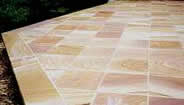Comparison of Different Paver Materials
Natural Stone Paver Material
 |
The use of natural stone creates a rustic, natural appeal. There are many of types of natural stone, quarried all over the world, which have been used for thousands of years. Natural stone can vary in density, from softer |
Natural stone is commonly applied to garden steps, pathways and garden borders. With a variety of colors, sizes and shapes available, there is bound to be something to suit your needs.
There is a large range of natural stone products:
- Sandstone
- Bluestone
- Limestone
- Granite
- Marble
- Cantera Stone
- Mexican Stone
- Travertine
Concrete Pavers
 |
Concrete pavers are produced to imitate the look of clay brick pavers. They are made with a combination of two main ingredients: cement and aggregate. Concrete pavers are available in a variety of styles to suit a variety of applications. There is also a large range of colors to choose from, through the use of dyes. |
It is however recommended that after installation, you should use color sealants on concrete pavers, so as to preserve and maintain the vibrant color,
The advantage of using concrete pavers for your driveways, walkways and patios, is that repairs are so easy to do. It is simply a matter removing the unwanted paver, and then replacing with a new one.
Poured and Stamped Concrete
Poured concrete slabs can be stamped with a pattern, resulting in an imitation of brick or flagstone paver stones. Colors can be achieved with the use of dyes and pigmentation but the colors may fade over time.
Poured and stamped concrete is a commonly used paver material applied to driveways and walkways. The reason why it is so popular is mainly due to the low costs involved compared to other types of materials. The costs may be quite low to start off with; however, the costs involved when it comes to maintenance can be considerable. |
 |
Maintaining poured and stamped concrete involves, cleaning and regular sealing. The real costs occur if you need repairs done. Concrete is difficult to repair, for it is sometimes necessary to re-pour from start to finish.
Clay Pavers
Clay pavers have proven to be one of the most durable types of paver material. It is a material that has been used for thousands of years, and continues to be popular today.
The process begins by drying clay and shale, then firing them at over 200 degrees Fahrenheit. The end result is a very strong, durable clay paver.
 |
The standout benefit of using clay pavers is their long-lasting vibrant color. Because clay is a natural material, it maintains its natural bright color, and will never fade. The colors range from dark charcoals, browns, reds and even pink shades. |
Clay pavers are also available in a wide variety of shapes from the traditional rectangle to bull nose, boardwalk and interlocking octagonal ones. There is a variety to suit any individual taste.
Permeable Paver Materials
The idea of permeable pavers is that water is able to seep through the material, in order to penetrate through to the ground. The water is absorbed by the soil, rather than becoming storm water runoff and entering our waterways. They can also help cut the costs of drainage systems development, curbs, pipes, gutters and culverts.
Here are three types of permeable paver materials:
Plastic Grid System — Permeable Pavers
 |
This permeable paver involves the use of a plastic grid-like system, commonly made using 100% recycled plastic. The plastic grid is laid, and then vegetation is planted in each grid hole. The grid is strong enough for heavy vehicles and heavy weather. The grids can hold water, after a storm, and gradually the water will absorb into the soil. |
These grid systems are often used for parking lots and recreational fields.
Block Pavers
Block pavers are used to permeate water while maintaining the look of bricks or stone paver materials. By inserting channels in-between the joints of each block paver, the water will flow down and gradually permeate into the soil beneath.
These permeable pavers are often used for driveways, walkways and terraces. Some manufacturers produce pavers in various shapes and patterns, which allows water to filter down slowly.
Porous Concrete
Concrete can become porous, if in the production process, pea gravel is used and a lower percentage of water to cement ratio is implemented. The result will be a much more pebble-like consistency in the concrete.
By implementing a porous concrete paver surface, you will save on drainage system costs, while helping the environment.





